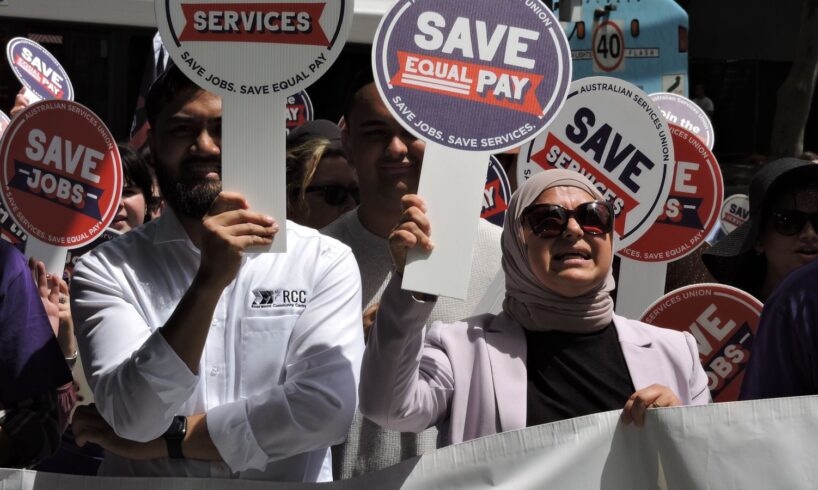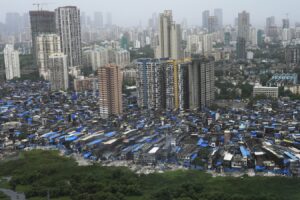
On Thursday, social, community, home care and disability service (SCHADS) workers participated in a National Day of Action called by the Australian Services Union (ASU) to protest retrogressive award restructuring proposals from the pro-business Fair Work Commission. A report on the rallies is published here.
World Socialist Web Site reporters spoke with protesters in Melbourne and Sydney.
Jackie
Jackie, 27, attended the Melbourne rally outside the State Library.
“Our pay is already quite average across the field, so any cut will be a ten-year step backwards since getting a SCHADS award. It will drive people out of the sector, which is already underfunded across the whole community. Staff won’t be retained for as long, and people will have to look elsewhere if they can’t make a living doing this job,” Jackie said.
“There’s already been some changes where I work—closing buildings where clients can go face-to-face—and that’s before these current proposed cuts. Because the government hasn’t put any extra funding into keeping these services afloat for ten years or even longer—our clients aren’t going to be able to access their services, and it will affect their health and wellbeing.”
Asked about SCHADS workers being asked to do tasks outside their job description without a pay rise, Jackie said: “The SCHADS award already has some vague descriptions around each role, so changing that is probably going to make it even vaguer and allow employers to get away with having people on lower pay grades but having to do different roles.”
Referring to the endless funding made available for the military and war, Jackie added:
“Government policies serve the interests of the banks and the corporations, that’s who any of them—Liberal or Labor—are backed by. The only difference is that Labor might appear a little bit more like they care about healthcare and whatnot but at the end of the day, their funding and backing is from the big corporations and banks, and that’s who they prioritise.”
“Governments are always looking for ways to take money away from this sector, vulnerable communities and the people that serve them. I’d like more focus on workers’ rights in political movements as a whole and—and if it comes to it—there should be a general strike in Australia to protect people’s jobs.”
Vanessa
Vanessa and fellow worker Lulu attended the Melbourne rally. They work with prisoners who are soon to be released and those who have recently left prison.
The FWC proposals, Vanessa said, “are abhorrent and unjust. They’re unfair and are attacking people integral to making our society function and be tolerable, especially for the marginalised and those that suffer from health conditions and disadvantage.
“It doesn’t recognise the experience and skills and qualifications of people that work in the sector, which means fewer case managers and people supporting our clients directly on the ground. They won’t get positive outcomes to go on and are necessary to lead more meaningful and less disadvantaged lives,” she explained.
“I see society in Australia definitely becoming more towards the ‘us and them,’” Lulu added. “That’s the reality of these actions that are being taken at the moment and that’s why we are protesting… We have to solidarise and support each other.”
Will, 23, said he attended the Melbourne rally to support the people who do important work for the disabled in the community. “My mum’s disabled as well and there’s a lot of disability workers who make everyone’s life a lot better. I work at a charitable organisation and the way we get funding is predominantly through grants, which is a difficult situation in itself.
“As a society, I don’t think we value our disability and community workers highly enough, even though this work underpins all of society and uplifts the people on the front lines of the different crises we’re facing. I consider myself a pacifist in many ways and think we could spend our money in better ways. We do need to redistribute wealth, land and power so that everyday people get what they need and are paid what they’re worth. Workers of the world need to unite. Without the redistribution of wealth and power nothing will change.
Biljana
Biljana, who works with people suffering from the impact of sexual violence, participated in the Sydney protest, which was held in Parramatta.
“I think the FWC proposals are totally disgusting,” she said. “We have been working hard for disability and support workers and social workers who work in human services to get paid adequately. That’s been a big fight so to now have someone say that your work is not worthy and you deserve less is very disappointing and unfair.
“The communities we work with are vulnerable and deserve a highly-skilled, well-paid workforce because this is what keeps people safe. There’s a whole range of things that make society not work well, but in a lot of other countries this sort of social safety net isn’t there. We’re quite fortunate in that there’s a safety net here, but to want to try and destroy, remove or minimise this, is pretty dangerous and unethical,” she said.
“My team works with the problems of sexual violence and family violence and in that space your work has a lot of risk. It involves a lot of managing and helping children heal and recover and supporting women and men to make changes. To see that work not adequately paid is wrong, and especially when you know that there are people doing data entry that get paid three times as much as our people. There’s just inequality in the system.
“The FWC is not actually valuing the work experience and the lived experience and the practice wisdom that our people have. It’s also cutting our ability to proceed or progress through the system. If there’s no growth or ability to move through and get your skills and experience recognised, then people will just leave. And this is bad because we’ve already got a skills shortage.
“I don’t understand what all this is supposed to achieve but I know it’s going to cause complete chaos. People will start to shift into either larger NGOs or full-profit agencies, which dilutes the work done with communities on the ground and this creates a whole ripple effect. It will also mean that people completely leave the sector,” Biljana added.
Jarmira works in family and domestic violence in the Nepean and Blue Mountains. “The impact of these proposals will be absolutely dreadful for workers, and this can flow on to the clients we assist,” she said.
“In my workplace, we highly value the lived experience of working in family and domestic violence but that’s not reflected whatsoever in the proposed changes, which will affect us greatly. Lived experience is so much more valuable a lot of times than formal education.
“If this is removed then it’ll be a disincentive for people to work in the industry and may simply mean it’s not worth them being in the industry any longer. This will have a flow-on effect for our clients and others experiencing family and domestic violence.
“We need to acknowledge that these industries, whether it be in community services, family and domestic violence, disability, aged care, are predominantly women-led industries but they seem to be the most disadvantaged when it comes to changes like these. If there’s no workers to support the women who are experiencing violence, what do they do then?”
Kristen
Kristen travelled with colleagues from Southern Youth and Family Services in the Wollongong area, south of Sydney, to attend the Parramatta rally.
“I work with young people and families that are either homeless or facing homelessness. Our sector will be dramatically impacted, because low pay won’t attract workers and especially those with the experience that our sector needs. It’s not just the difficulty of finding housing—especially for young people—it’s getting the right people to do this work,” she explained.
“Everyone knows the homelessness and housing crisis won’t go away but it seems the Fair Work Commission doesn’t have a clue, and now AiG [big-business lobbyist Australian Industry Group] is threatening us. I was shocked by this, but AiG should know that this won’t stop us fighting for our rights and the necessity of our work for the whole community,” Kristen said.
Sign up for the WSWS Health Care Workers Newsletter!





